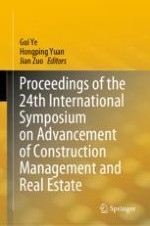2021 | OriginalPaper | Buchkapitel
Decoupling Relationship Between Economic Growth and Industrial Wastewater Discharges: A Case Study of Four Municipalities in China
verfasst von : Xia Liao, Yitian Ren, Nan Yang, Tianheng Shu
Erschienen in: Proceedings of the 24th International Symposium on Advancement of Construction Management and Real Estate
Verlag: Springer Singapore
Aktivieren Sie unsere intelligente Suche, um passende Fachinhalte oder Patente zu finden.
Wählen Sie Textabschnitte aus um mit Künstlicher Intelligenz passenden Patente zu finden. powered by
Markieren Sie Textabschnitte, um KI-gestützt weitere passende Inhalte zu finden. powered by
